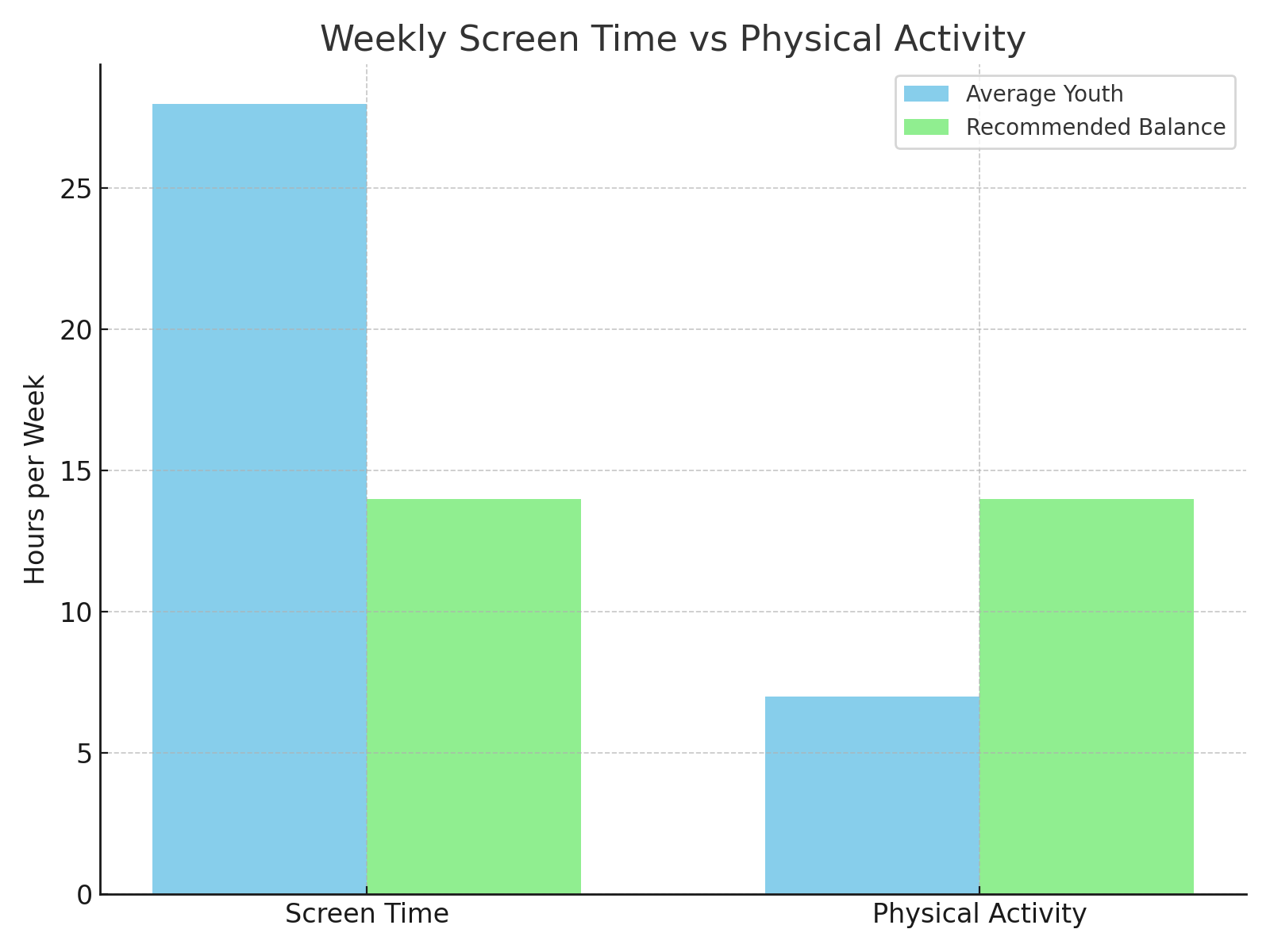
Striking the Right Balance: Navigating Screen Time for Young Athletes
Striking the Right Balance: Navigating Screen Time and Physical Activity for Young Athletes
In today's digital playground, screens are as enticing as the games on the field. But when does screen time start to sideline a young athlete's performance?
Imagine a seesaw: on one end, the vibrant world of digital devices; on the other, the physical demands of athleticism. Finding equilibrium is crucial for the health and success of young athletes.
With the surge in digital device usage among youth, understanding the implications of screen time on young athletes is more important than ever. This article delves into the physical and psychological effects of excessive screen exposure and offers actionable strategies to harmonize screen engagement with athletic pursuits.
The Physical Toll of Excessive Screen Time
From Couch to Competition: The Sedentary Trap
Hours spent glued to screens can transform active youngsters into sedentary spectators. This inactivity is a gateway to weight gain and associated health concerns.
"Physical activity is vital for a child's development and well-being." — American Academy of Pediatrics
Statistic: Studies have linked excessive screen time to increased risk of obesity and insulin resistance in children and adolescents. [Source: PMC]
Posture Perils: The Hidden Strain
Slouching over devices isn't just a bad look; it's a recipe for musculoskeletal issues that can impair athletic performance.
"Good posture is essential for optimal athletic performance and injury prevention." — National Academy of Sports Medicine
Statistic: Prolonged screen use has been associated with back pain and headaches in youth. [Source: PMC]
Screen-Induced Sleep Sabotage
The glow of screens before bedtime can disrupt sleep patterns, leading to fatigue and diminished reaction times on the field.
"Adequate sleep is a key component of athletic performance." — Sleep Foundation
Statistic: Screen use during bedtime is linked to shorter sleep duration and poorer sleep quality among youth. [Source: PMC]
The Psychological Impact of Screen Overload
Gaming Gains: Cognitive Benefits or Distractions?
While certain video games can enhance hand-eye coordination and problem-solving skills, overindulgence may detract from essential athletic training.
"Moderation is key in all aspects of training and recreation." — Coach John Wooden
Statistic: Excessive recreational screen time is a risk factor for increased anxiety in student athletes. [Source: PMC]
Screen Addiction: The Mental Health Connection
Overuse of digital devices can lead to addictive behaviors, social isolation, and heightened stress levels, all of which can undermine an athlete's mental game.
"Mental health is just as important as physical health in athletes." — Sports Psychologist Dr. Megan Jones
Statistic: Limiting screen time and promoting physical activity from childhood may help safeguard mental health in adolescence. [Source: ScienceDaily]
Charting a Balanced Course
Setting Boundaries: Screen Time Limits
Implementing clear guidelines on screen usage helps young athletes prioritize their physical health and training commitments.
"Discipline is the bridge ::contentReference[oaicite:0]{index=0} "Discipline is the bridge between goals and accomplishment." — Jim Rohn
Using Tech to Boost, Not Block, Performance
Not all screen time is counterproductive. Fitness tracking apps, virtual training platforms, and sports psychology tools can empower athletes when used intentionally.
"Technology is a tool. In terms of getting the kids working together and motivating them, the teacher is the most important." — Bill Gates
Visualizing the Balance
The chart below highlights the typical weekly hours young people spend on screens versus physical activity—and what an ideal balance might look like.

FAQ: Your Questions Answered
1. What’s the recommended screen time for young athletes?
The American Academy of Pediatrics recommends no more than 2 hours of recreational screen time per day for youth, excluding school work.
2. Can screen time ever be beneficial for sports training?
Yes! Apps that teach strategy, movement, or mindfulness can support performance when used with intention and limits.
3. What’s the biggest risk of excessive screen time?
Aside from sedentary habits, the biggest risks include mental fatigue, poor sleep, and reduced in-person social interaction—all of which impact performance.
Action Steps for Parents, Coaches & Athletes
- Set daily screen time limits using device settings or family agreements.
- Promote outdoor play and team sports to build physical habits early.
- Designate screen-free zones (like bedrooms and dinner tables).
- Use screen time to support sports (video analysis, fitness tracking, etc.).
- Lead by example—adults should model balanced tech use, too.
- Talk regularly with young athletes about how screen time affects their mood and performance.
Conclusion: Build Champions On and Off the Screen
Screen time isn’t the enemy—but imbalance is. Young athletes thrive when their days are filled with movement, rest, social interaction, and purpose-driven tech use. As parents, coaches, and mentors, it’s our job to guide them toward that sweet spot where health and performance intersect.
Let’s raise the next generation of athletes not just to be stronger—but to be smarter and more balanced, too.
💬 Join the Conversation
How do you manage screen time for your athlete? What tools or strategies have helped create a healthier balance in your home or team? Share your thoughts in the comments, and don’t forget to pass this along to others who care about the well-being of our future champions!




